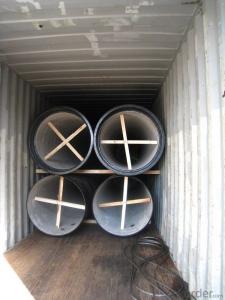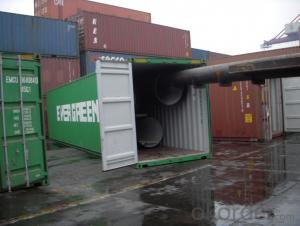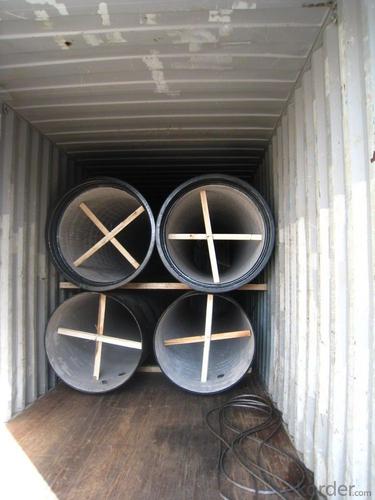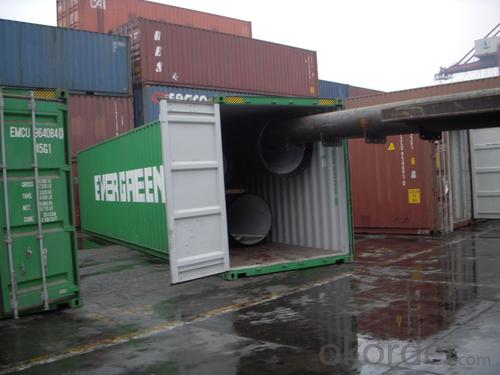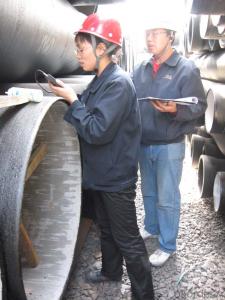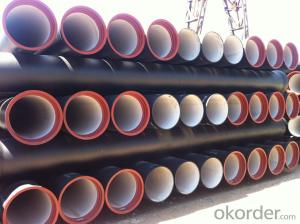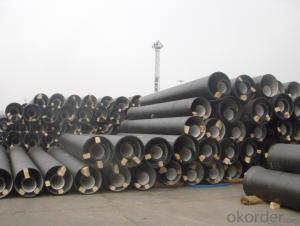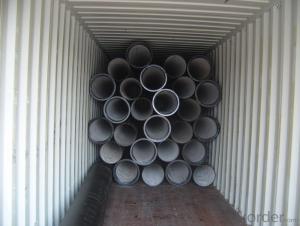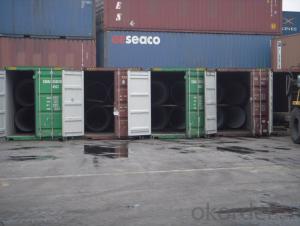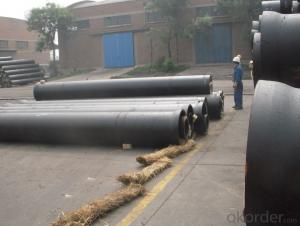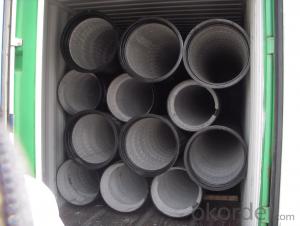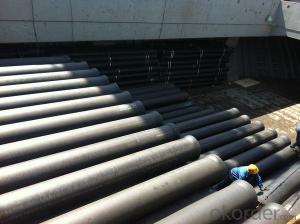DUCTILE IRON PIPE AND PIPE FITTINGS C CLASS DN125
- Loading Port:
- Tianjin
- Payment Terms:
- TT OR LC
- Min Order Qty:
- 23 pc
- Supply Capability:
- 3000 pc/month
OKorder Service Pledge
OKorder Financial Service
You Might Also Like
· Material : Ductile Cast Iron
· Size Range : DN 80mm to DN 2000mm
· Unit Effective Length : 6m or 5.7m
· Manufacture Standard: ISO 2531:1998/ EN 545:2006/EN 598:2007
· Annual capacity : 200,000 tons
· Coating Exterior: Zinc 130g/m2 according to ISO 8179-1 and bitumen coating 70 microns.
· Cement Interior: Portland Cement/ High Alumina Cement/ Sulphate Resisting Cement Lining according to ISO 4179
· Special requirements on external coating and internal lining can be applied
· We also provide accessories such as SBR/EPDM rubber gaskets, lubricant paste, pipe caps, PE sleeves, etc.
Additional Parts:
Each pipe is strictly inspected according to related standard to ensure permanently high performance.
Easy Installation at site and service free for life
Long Service Lifespan
Quotation will arrive you within 24hours once we get your inquiry.
We guarantee offering you a competitive price.
A copy of original inspection reports of pipes will be offered after shipment.
Photos of loading process will be sent to the customer after shipment effect.
We will follow-up the delivery progress after shipment effect and update to the customer on weekly basis.
- Q: How is ductile iron pipe different from cast iron pipe?
- Ductile iron pipe and cast iron pipe are commonly used in plumbing and drainage applications, but they have differences in composition, strength, and flexibility. To begin with, ductile iron pipe is made from a different iron alloy than cast iron pipe. Ductile iron contains more carbon and silicon, which gives it increased strength and durability. On the other hand, cast iron pipe is made from gray iron, which has higher carbon content but lacks the flexibility of ductile iron. Moreover, ductile iron pipe is renowned for its superior strength and resistance to impact. It can withstand higher pressures and is less likely to crack or break under heavy loads or external forces. Cast iron pipe, although strong, is more brittle and prone to fractures and failures. Another significant distinction is the flexibility of ductile iron pipe. It possesses greater flexibility and can endure bending and deformation without fracturing. This flexibility facilitates easier installation, particularly in areas with uneven terrain or where ground movement may occur. In contrast, cast iron pipe is less flexible and more rigid, making it unsuitable for applications that require flexibility. Additionally, ductile iron pipe has a smoother interior surface compared to cast iron pipe. This smoothness reduces friction, enhances flow efficiency, and minimizes the accumulation of sediment and deposits within the pipe, resulting in improved water flow and reduced maintenance needs. In conclusion, ductile iron pipe sets itself apart from cast iron pipe due to its composition, strength, flexibility, and smooth interior surface. Ductile iron offers superior strength, impact resistance, and flexibility, making it the preferred choice in various plumbing and drainage applications.
- Q: Will the cast iron pipes rust?
- Qualified ductile iron pipe requires lining standard cement. The outer wall of pipe needs spraying zinc treatment and asphalt paint coating, and other epoxy resin paint can also be selected.
- Q: How are ductile iron pipes protected against internal corrosion caused by chemicals?
- To safeguard against internal corrosion caused by chemicals, ductile iron pipes implement various protective measures. Primarily, these pipes are equipped with either a cement mortar lining or an epoxy coating, creating a barrier between the water or sewage's chemical substances and the iron material. This barrier effectively prevents direct contact, thereby averting corrosion. Additionally, a corrosion-resistant polymer or bituminous coating is frequently applied to the pipes' exterior. This supplementary layer of protection shields the pipes from potential chemical exposure originating externally. Moreover, cathodic protection is a commonly employed technique to counter internal corrosion. Sacrificial anodes, typically composed of zinc or magnesium, are affixed to the pipes. Over time, these anodes undergo corrosion instead of the iron, sacrificing themselves to safeguard the pipes against chemical-induced corrosion. Furthermore, regular maintenance and monitoring play a crucial role in the prevention and rectification of corrosion issues. This entails routine inspections, cleaning, and prompt repair of any corroded or damaged areas. Overall, the integration of lining, external coating, cathodic protection, and maintenance practices ensures the comprehensive protection of ductile iron pipes against internal corrosion caused by chemicals. This prolongs their lifespan and guarantees the integrity of the pipeline system.
- Q: General cast iron prices now
- Regular cast iron prices now range between 5000 and 8000.Ductile iron is a kind of high strength cast iron material developed in 50s twentieth Century, its comprehensive performance is close to the steel, it is based on its excellent performance, has been successfully used in casting complex stress, strength, toughness and wear resistance requirements of the higher parts. Nodular cast iron has developed rapidly to be second only to grey cast iron and widely used as cast iron material. The so-called "iron instead of steel", mainly refers to ductile iron.
- Q: How does ductile iron pipe compare to steel pipe in terms of durability?
- Ductile iron pipe is generally considered to be more durable than steel pipe. It has superior strength and durability due to its unique microstructure, which allows it to withstand higher levels of pressure, impacts, and loads. Ductile iron pipe also has better corrosion resistance properties, making it less prone to rust and deterioration compared to steel pipe. Additionally, ductile iron pipe has a longer lifespan and requires less maintenance, making it a more reliable and durable choice for various applications.
- Q: What is the minimum operating temperature for ductile iron pipes?
- Ductile iron pipes typically have a minimum operating temperature of -40 degrees Celsius, showcasing its exceptional strength and ductility in cold conditions. This makes it a versatile option for various purposes, such as water and wastewater systems. Nevertheless, it is crucial to acknowledge that the specific minimum operating temperature may differ based on factors such as the grade of ductile iron employed and the requirements of the application. It is highly advisable to refer to the manufacturer's specifications and guidelines for the appropriate utilization and optimal performance of ductile iron pipes in cold temperatures.
- Q: Are ductile iron pipes suitable for use in residential plumbing?
- Yes, ductile iron pipes are suitable for use in residential plumbing. They are known for their durability, strength, and resistance to corrosion, making them a reliable choice for plumbing systems.
- Q: How are ductile iron pipes different from cast iron pipes?
- Ductile iron pipes are different from cast iron pipes in terms of their composition and properties. Ductile iron pipes are made from a type of cast iron that has been treated with magnesium to improve its strength and flexibility. This makes ductile iron pipes more durable, impact-resistant, and less prone to cracking or breaking compared to traditional cast iron pipes. Additionally, ductile iron pipes have a higher tensile strength, allowing them to withstand higher internal and external pressures. In summary, ductile iron pipes are a more modern and advanced version of cast iron pipes, offering improved performance and longevity.
- Q: How do ductile iron pipes perform in high-pressure applications?
- Ductile iron pipes are known for their exceptional strength and durability, making them highly suitable for high-pressure applications. These pipes are designed to withstand immense internal and external pressures, making them well-suited for underground or above-ground installations where high-pressure conditions are expected. One of the key advantages of ductile iron pipes in high-pressure applications is their ability to resist cracking or bursting. The inherent ductility of the material allows it to absorb and distribute the pressure evenly, minimizing the risk of failure under high-pressure conditions. This makes ductile iron pipes a reliable choice for water supply systems, oil and gas pipelines, and other applications where the pipe is subjected to significant pressure. Additionally, ductile iron pipes have excellent corrosion resistance properties, which further enhances their performance in high-pressure environments. The pipes are typically coated with a protective layer, such as cement mortar or epoxy, which acts as a barrier against corrosion. This protective coating prevents the formation of rust or scale inside the pipe, ensuring a smooth flow and maintaining the structural integrity even under high-pressure conditions. Furthermore, ductile iron pipes have a high tolerance for external loads, such as soil pressure, traffic loads, or other external forces. This strength enables them to withstand the additional stress that may be present in high-pressure applications, ensuring the long-term reliability and performance of the pipe system. Overall, ductile iron pipes offer exceptional performance in high-pressure applications. Their strength, durability, corrosion resistance, and ability to withstand external loads make them a reliable choice for various industries and infrastructure projects where high-pressure conditions are a concern.
- Q: How are ductile iron pipes protected against stray current corrosion?
- Ductile iron pipes are protected against stray current corrosion through the implementation of various measures. One common method is the installation of a protective coating, such as an epoxy or zinc coating, on the external surface of the pipes. This coating acts as a barrier, preventing direct contact between the pipe and the surrounding soil or water. Additionally, cathodic protection systems, such as impressed current or sacrificial anode systems, can be employed to further protect the pipes. These systems help to control and redirect stray currents, minimizing their impact on the ductile iron pipes and preventing corrosion.
Send your message to us
DUCTILE IRON PIPE AND PIPE FITTINGS C CLASS DN125
- Loading Port:
- Tianjin
- Payment Terms:
- TT OR LC
- Min Order Qty:
- 23 pc
- Supply Capability:
- 3000 pc/month
OKorder Service Pledge
OKorder Financial Service
Similar products
Hot products
Hot Searches
Related keywords
